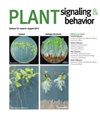外源性褪黑激素可延缓葡萄幼苗叶片衰老并增强其耐盐碱胁迫能力
IF 2.8
4区 生物学
Q3 BIOCHEMISTRY & MOLECULAR BIOLOGY
引用次数: 0
摘要
摘要 盐碱胁迫是农业生产面临的主要非生物胁迫之一,严重抑制植物的生长和产量。施用植物生长调节剂可有效防止盐碱胁迫造成的作物减产。外源褪黑激素(MT)可作为一种信号分子参与植物体内多种生理过程的调控,已被发现在提高植物对非生物胁迫的耐受性方面发挥着关键作用。然而,外源 MT 对鲜食葡萄幼苗耐盐碱能力的影响及其机制尚未明确。本研究旨在探讨外源 MT 对盐碱胁迫下鲜食葡萄幼苗形态和生理生长的影响。结果表明,盐碱胁迫导致葡萄叶片变黄、枯萎,叶绿素含量下降,而施用外源 MT 能缓解盐碱胁迫引起的葡萄幼苗叶片叶绿素降解,促进可溶性糖和脯氨酸含量的积累。此外,外源 MT 还能提高抗氧化酶的活性,从而清除盐碱胁迫产生的活性氧(ROS)。总之,外源 MT 参与了葡萄幼苗对盐碱胁迫的耐受,增强了葡萄幼苗的耐盐碱能力,促进了盐碱地葡萄产业的生长和发展。本文章由计算机程序翻译,如有差异,请以英文原文为准。
Exogenous melatonin delays leaves senescence and enhances saline and alkaline stress tolerance in grape seedlings
ABSTRACT Saline and alkaline stress is one of the major abiotic stresses facing agricultural production, which severely inhibits the growth and yield of plant. The application of plant growth regulators can effectively prevent crop yield reduction caused by saline and alkaline stress. Exogenous melatonin (MT) can act as a signaling molecule involved in the regulation of a variety of physiological processes in plants, has been found to play a key role in enhancing the improvement of plant tolerance to abiotic stresses. However, the effects of exogenous MT on saline and alkaline tolerance of table grape seedlings and its mechanism have not been clarified. The aim of this study was to investigate the role of exogenous MT on morphological and physiological growth of table grape seedlings (Vitis vinifera L.) under saline and alkaline stress. The results showed that saline and alkaline stress resulted in yellowing and wilting of grape leaves and a decrease in chlorophyll content, whereas the application of exogenous MT alleviated the degradation of chlorophyll in grape seedling leaves caused by saline and alkaline stress and promoted the accumulation of soluble sugars and proline content. In addition, exogenous MT increased the activity of antioxidant enzymes, which resulted in the scavenging of reactive oxygen species (ROS) generated by saline and alkaline stress. In conclusion, exogenous MT was involved in the tolerance of grape seedlings to saline and alkaline stress, and enhanced the saline and alkaline resistance of grape seedlings to promote the growth and development of the grape industry in saline and alkaline areas.
求助全文
通过发布文献求助,成功后即可免费获取论文全文。
去求助
来源期刊

Plant Signaling & Behavior
Agricultural and Biological Sciences-Plant Science
CiteScore
6.00
自引率
3.40%
发文量
111
期刊介绍:
Plant Signaling & Behavior, a multidisciplinary peer-reviewed journal published monthly online, publishes original research articles and reviews covering the latest aspects of signal perception and transduction, integrative plant physiology, and information acquisition and processing.
 求助内容:
求助内容: 应助结果提醒方式:
应助结果提醒方式:


